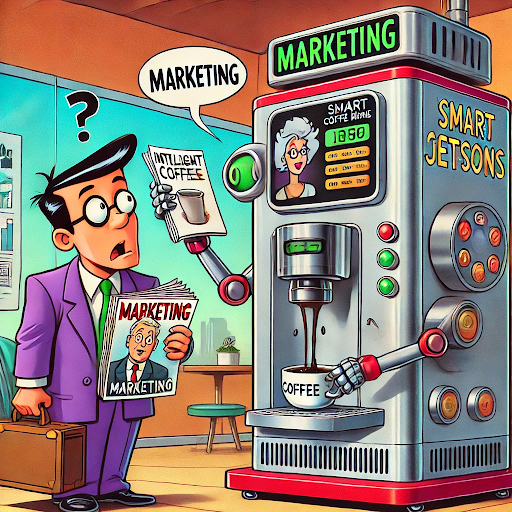
The Coffee Machine Conundrum
Picture this: You’re at your desk, groggy-eyed and bleary from too many late nights. The office coffee machine, an old relic with buttons that seem to require a PhD in engineering, grumbles to life. You press the button, and, lo and behold, the coffee starts flowing. It’s not just any coffee; it’s the perfect blend, smooth, aromatic, and strong enough to kickstart your brain. Suddenly, you think, “Why does my coffee machine get it right, but my marketing strategy feels like a never-ending puzzle?”
This, dear reader, is the essence of our current dilemma. While our coffee machines have become marvels of simplicity and efficiency, our marketing strategies often resemble a chaotic mess of spreadsheets, social media posts, and half-remembered marketing theories. It’s time we had a serious chat about why your coffee machine might be smarter than your marketing—and how you can bridge that gap.
The Simple Truth: Coffee Machines and AI
Let’s be honest: Coffee machines don’t have degrees in marketing, yet they can brew a perfect cup every time. They’ve been programmed with algorithms that consider water temperature, coffee grind, and brew time. They don’t overthink it; they just deliver. And here’s the kicker: Your coffee machine’s “AI” is essentially a set of rules and data points, much simpler than the complex algorithms we often fear in marketing.
So, why aren’t our marketing efforts as straightforward? Why do we struggle with targeting the right audience, crafting compelling messages, and measuring our success? It’s time to demystify AI and see how you can apply its principles to your marketing without turning your office into a high-tech lab.
The Tale of the Two Campaigns
Let’s talk about Susan, a business owner who runs a quaint bookstore. Her marketing strategy has always been a mix of flyers, local ads, and the occasional social media post. Sales were steady, but Susan knew she could do better. One day, she decided to give AI a try. She started with a simple AI-driven tool that analyzed customer data to tailor her marketing campaigns.
Her first AI campaign was laughably simple. It took her existing customer data—ages, purchase history, favorite genres—and created personalized email offers. The results were staggering. Open rates soared, and her sales increased by 30% in just a month. Susan was astonished. “It’s like having a marketing expert who never sleeps,” she said, grinning over her morning coffee. Her AI coffee machine had become a metaphor for what was possible with technology.
The Gritty Reality: Starting Small
Now, let’s get real. Implementing AI doesn’t mean you need a team of tech wizards or a budget as big as a tech giant’s. Start small. Begin with tools that are easy to integrate and don’t require a steep learning curve. For instance, simple chatbots can handle customer inquiries 24/7, freeing up your time and enhancing customer service. Tools like these are as intuitive as your coffee machine’s interface, making your life a lot easier without the headache of complex setups.
Take Mike, who runs a small online store selling custom skateboards. He was skeptical about AI until he stumbled upon an AI tool that optimized his product listings. Within days, his sales started to climb. The AI suggested tweaks to his product descriptions and pricing strategies based on customer behavior data. Mike chuckled one evening, looking at his sales dashboard. “Who knew a robot could teach an old skateboarder new tricks?” he mused, sipping his well-brewed coffee.
It’s Not All Sunshine and Rainbows
While AI offers numerous benefits, it’s not all sunshine and rainbows. There will be challenges. Implementing AI can sometimes feel like trying to decode a coffee machine manual written in a foreign language. There’s a learning curve, and not every tool will be a perfect fit for your business. Expect a few bumps along the road. You might find yourself troubleshooting more than you’d like at first, and there will be moments of frustration.
But here’s the thing: Persevere. Like perfecting your morning brew, it takes some trial and error. The payoff is worth it. Those early hurdles will pave the way for smoother operations and more efficient marketing strategies. It’s about progress, not perfection.
The Human Touch: Keeping It Real
While AI can streamline processes and boost efficiency, it’s crucial to remember that it’s not here to replace you—it’s here to enhance you. The real magic happens when you combine AI’s data-driven insights with your human creativity and intuition. It’s like having a barista who knows exactly how you like your coffee but lets you decide on the perfect blend.
Take the story of Rachel, who owns a boutique bakery. She used AI to analyze customer preferences and tweak her marketing messages. But Rachel didn’t just rely on the data. She added her personal touch, creating quirky social media posts and engaging with her customers in a way only she could. The result? Her bakery became a local sensation, with customers lining up not just for the pastries but for the experience.
From Skeptic to Believer: The Uplifting Journey
So, if you’re standing at the crossroads of technology and tradition, wondering if AI is worth the hassle, take a moment. Think about your coffee machine. It’s simple, effective, and makes your life easier. AI can do the same for your business. It doesn’t have to be complicated or intimidating. Start with small, manageable steps, experiment, and see the results for yourself.
Remember Jane, who once thought AI was for the tech giants only. Today, her business runs smoother, her marketing is more targeted, and her coffee never tasted better. She laughs now, “Who knew the key to better marketing was in my coffee machine all along?”
Embrace the AI revolution, keep it real, and watch as your business, just like your morning brew, starts to hit the sweet spot. The future is here, and it’s not magic—it’s just really, really smart. Cheers to that!